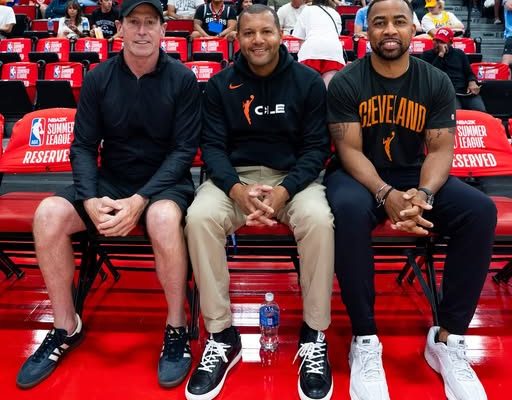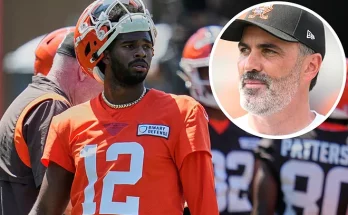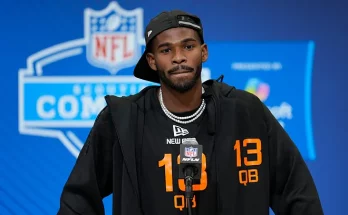Cleveland’s re-entry into the WNBA landscape has already begun with a resounding show of support from the community, and it’s not even 2028 yet. The newly announced Cleveland WNBA franchise has made waves by surpassing 5,000 initial payments for season ticket memberships, setting a firm tone of anticipation ahead of its inaugural season at Rocket Mortgage FieldHouse in three years. The announcement, made public earlier today, marks a significant milestone for both the franchise and the broader WNBA movement, especially as the league continues its expansion trajectory into untapped, basketball-rich markets.
The number—5,000—is more than just a ticketing statistic. It’s a symbol of a city’s readiness. It represents a thirst for professional women’s basketball in one of America’s most storied sports towns. Cleveland, once home to the Rockers from 1997 to 2003, has long been considered a sleeping giant in the WNBA space, with its passionate fan base, modern arena infrastructure, and growing emphasis on community-focused sports initiatives. With this early surge of support, it’s clear that the city is not only ready but roaring to welcome back professional women’s basketball with the kind of energy that reverberates beyond box scores and standings.
The initial payment campaign began just weeks after the official announcement of Cleveland’s inclusion in the league’s upcoming expansion. Launched with relatively minimal marketing compared to other major league rollouts, the campaign relied heavily on digital engagement, targeted emails to past Rockers fans, partnerships with local schools and girls’ basketball programs, and support from the Cleveland Cavaliers, whose ownership group will also be backing the WNBA franchise. That organic-style marketing approach speaks volumes about the grassroots enthusiasm already in place, and to have 5,000 people financially commit before a roster is even announced or a jersey unveiled proves that this initiative has deep emotional and cultural resonance.
While WNBA commissioner Cathy Engelbert has long expressed interest in strategic expansion, Cleveland’s rapid show of market demand provides a valuable case study. It reflects a blend of nostalgia and modern empowerment. Many in the city remember the days of the Rockers fondly—the on-court intensity, the community engagement, and the strong presence the team held during its short but impactful tenure. But what makes this return different is the generational evolution in how women’s sports are viewed and valued. With increased national media exposure, player-led branding, and cultural shifts toward equity and representation, the Cleveland WNBA project is arriving at just the right time.
Inside the Rocket Mortgage FieldHouse offices, there’s reportedly a growing sense of pride and responsibility. Executives close to the franchise’s launch are aware that these early commitments are more than financial—they’re emotional investments. Fans are buying into the vision of what this team will become, sight unseen, and the pressure to deliver a product that reflects the passion of its supporters is both exhilarating and immense. Conversations within the front office have focused not only on team building and operational logistics but also on how to deliver an experience that feels uniquely Cleveland—tough, community-driven, resilient, and proud.
That community-first ethos has guided every step of the process so far. From collaboration with Cleveland Metropolitan School District to preliminary partnerships with local nonprofits aimed at promoting youth basketball and gender equality, the team is positioning itself not just as a sporting enterprise but as a civic entity. This approach has likely played a major role in the early ticketing success. Fans don’t merely want to attend games—they want to be part of a movement, a team that embodies the heart of their city and reflects their values back at them.
Cleveland’s successful pre-sale also sends a strong message to other potential WNBA markets and reinforces the league’s thesis that there is substantial untapped demand for professional women’s basketball. With the Bay Area set to host a new team and continued speculation about markets like Toronto, Portland, and Nashville, Cleveland’s momentum helps create a model. It shows that, given the right mix of historical context, community ties, and promotional strategy, even a market without recent WNBA ties can ignite quickly.
The Cavs organization, under the ownership of Dan Gilbert and the Rock Entertainment Group, has been instrumental in shaping the foundation of the new franchise. Gilbert’s influence in revitalizing Cleveland’s downtown, investing in cutting-edge renovations at Rocket Mortgage FieldHouse, and creating inclusive sports platforms has laid the groundwork for a seamless integration of the WNBA team. The same ticketing systems, fan engagement platforms, and digital marketing tools that power the Cavaliers’ success are being repurposed and optimized for this new venture. That kind of logistical synergy could prove invaluable as the franchise builds toward its 2028 launch.
As for the fan base itself, the early adopters span generations and demographics. There are longtime Rockers fans thrilled to once again wear their old gear and celebrate women’s hoops. There are young girls and families who see the WNBA’s return as a vital source of inspiration. There are even local college athletes and coaches who recognize the developmental boost that having a pro franchise nearby can bring to the grassroots game. The excitement isn’t limited to basketball either. For many, this new WNBA team represents progress—proof that the city is evolving and inclusive enough to support women at the highest level of sport.
Of course, crossing the 5,000 mark is just one part of the journey. Over the next three years, the real work begins. Building a front office, hiring a head coach, establishing a scouting infrastructure, assembling a competitive roster, securing sponsorships, and developing a brand identity that resonates with Clevelanders—all of these milestones remain ahead. But with 5,000 season ticket payments in hand, the runway has never looked more promising.



